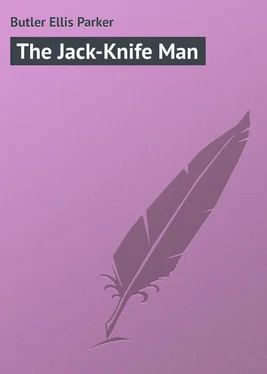Ellis Butler - The Jack-Knife Man
Здесь есть возможность читать онлайн «Ellis Butler - The Jack-Knife Man» — ознакомительный отрывок электронной книги совершенно бесплатно, а после прочтения отрывка купить полную версию. В некоторых случаях можно слушать аудио, скачать через торрент в формате fb2 и присутствует краткое содержание. Жанр: foreign_prose, на английском языке. Описание произведения, (предисловие) а так же отзывы посетителей доступны на портале библиотеки ЛибКат.
- Название:The Jack-Knife Man
- Автор:
- Жанр:
- Год:неизвестен
- ISBN:нет данных
- Рейтинг книги:3 / 5. Голосов: 1
-
Избранное:Добавить в избранное
- Отзывы:
-
Ваша оценка:
- 60
- 1
- 2
- 3
- 4
- 5
The Jack-Knife Man: краткое содержание, описание и аннотация
Предлагаем к чтению аннотацию, описание, краткое содержание или предисловие (зависит от того, что написал сам автор книги «The Jack-Knife Man»). Если вы не нашли необходимую информацию о книге — напишите в комментариях, мы постараемся отыскать её.
The Jack-Knife Man — читать онлайн ознакомительный отрывок
Ниже представлен текст книги, разбитый по страницам. Система сохранения места последней прочитанной страницы, позволяет с удобством читать онлайн бесплатно книгу «The Jack-Knife Man», без необходимости каждый раз заново искать на чём Вы остановились. Поставьте закладку, и сможете в любой момент перейти на страницу, на которой закончили чтение.
Интервал:
Закладка:
Ellis Parker Butler
The Jack-Knife Man
I. THE JACK-KNIFE MAN
PETER LANE GEORGE RAPP, the red-faced livery-man from town, stood with his hands in the pockets of his huge bear-skin coat, his round face glowing, looking down at Peter Lane, with amusement wrinkling the corners of his eyes.
“Tell you what I’ll do, Peter,” he said, “I’ll give you thirty-five dollars for the boat.”
“I guess I won’t sell, George,” said Peter. “I don’t seem to care to.”
He was sitting on the edge of his bunk, in the shanty-boat he had spent the summer in building. He was a thin, wiry little man, with yellowish hair that fell naturally into ringlets: but which was rather thin on top of his head. His face was brown and weather-seamed. It was difficult to guess just how old Peter Lane might be. When his eyes were closed he looked rather old-quite like a thin, tired old man-but when his eyes were open he looked quite young, for his eyes were large and innocent, like the eyes of a baby, and their light blue suggested hopefulness and imagination of the boyish, aircastle-building sort.
The shanty-boat was small, only some twenty feet in length, with a short deck at either end. The shanty part was no more than fifteen feet long and eight feet wide, built of thin boards and roofed with tar paper. Inside were the bunk – of clean white pine – a home-made pine table, a small sheet-iron cook-stove, two wooden pegs for Peter’s shotgun, a shelf for his alarm-clock, a breadbox, some driftwood for the stove, and a wall lamp with a silvered glass reflector. In one corner was a tangle of nets and trot-lines. It was not much of a boat, but the flat-bottomed hull was built of good two-inch planks, well caulked and tarred. Tar was the prevailing odor. Peter bent over his table, on which the wheels and springs of an alarm-clock were laid in careful rows.
“Did you ever stop to think, George, what a mighty fine companion a clock like this is for a man like I am?” he asked. “Yes, sir, a tin clock like this is a grand thing for a man like me. I can take this clock to pieces, George, and mend her, and put her together again, and when she’s mended all up she needs mending more than she ever did. A clock like this is always something to look forward to.”
“I might give as much as forty dollars for the boat,” said George Rapp temptingly.
“No, thank you, George,” said Peter. “And it ain’t only when you ‘re mending her that a clock like this is interesting. She’s interesting all the time, like a baby. She don’t do a thing you’d expect, all day long. I can mend her right up, and wind her and set her right in the morning, and set the alarm to go off at four o’clock in the afternoon, and at four o’clock what do you think she’ll be doing? Like as not she’ll be pointing at half-past eleven. Yes, sir! And the alarm won’t go off until half-past two at night, maybe. Why I mended this clock once and left two wheels out of her – ”
“Tell you what I’ll do, Peter,” said Rapp, “I’ll give fifty dollars for the boat, and five dollars for floating her down to my new place down the river.”
“I’m much obliged, but I guess I won’t sell,” said Peter nervously. “You better take off your coat, George, unless you want to hurry away. That stove is heating up. She’s a wonderful stove, that stove is. You wouldn’t think, to look at her right now, that she could go out in a minute, would you? But she can. Why, when she wants to, that stove can start in and get red hot all over, stove-pipe and legs and all, until it’s so hot in here the tar melts off them nets yonder – drips off ‘em like rain off the bob-wires. You’d think she’d suffocate me out of here, but she don’t. No, sir. The very next minute she’ll be as cold as ice. For a man alone as much as I am that’s a great stove, George.”
“Will you sell me the boat, or won’t you?” asked Rapp.
“Now, I wish you wouldn’t ask me to sell her, George,” said Peter regretfully, for it hurt him to refuse his friend. “To tell you the honest truth, George, I can’t sell her because it would upset my plans. I’ve got my plans all laid out to float down river next spring, soon as the ice goes out, and when I get to New Orleans I’m going to load this boat on to a ship, and I’m going to take her to the Amazon River, and trap chinchillas. I read how there’s a big market for chinchilla skins right now. I’m goin’ up the Amazon River and then I’m goin’ to haul the boat across to the Orinoco River and float down the Orinoco, and then – ”
“You told me last week you were going down to Florida next spring and shoot alligators from this boat,” said Rapp.
Peter looked up blankly, but in a moment his cheerfulness returned.
“If I didn’t forget all about that!” he began. “Well, sir, I’m glad I did! That would have been a sad mistake. It looks to me like alligator skin was going out of fashion. I’d be foolish to take this boat all the way to Florida and then find out there was no market for alligator skins, wouldn’t I?”
“You would,” said Rapp. “And you might get down there in South America and find there was no market for chinchillas. It looks to me as if the style was veering off from chinchillas already. You’d better sell me the boat, Peter.”
“You know I’d sell to you if I would to anybody, George,” said Peter, pushing aside the works of the clock, “but this boat is a sort of home to me, George. It’s the only home I ‘ve got, since Jane don’t want me ‘round no more. You’re the best friend I’ve got, and you’ve done a lot for me – you let me sleep in your stable whenever I want to, and you give me odd jobs, and clothes – and I appreciate it, George, but a man don’t like to get rid of his home, if he can help it. I haven’t had a home I could call my own since I was fourteen years old, as you might say, and I’m going on fifty years old now. Ever since Jane got tired havin’ me ‘round I’ve been livin’ in your barn, and in old shacks, and anywheres, and now, when I’ve got a boat that’s a home for me, and I can go traveling in her whenever I want to go, you want me to sell her. No, I don’t want to sell her, George. I think maybe I’ll start her down river to-morrow, so as to be able to start up the Missouri when the ice goes out – ”
“I thought you said Amazon a minute ago,” said Rapp.
“Well, now, I don’t know,” said Peter soberly. “The fevers they catch down there wouldn’t do my health a bit of good. Rocky Mountain air is just what I need. It is grand air. If I can get seventy or eighty dollars together, and a good rifle or two, I may start next spring. I always wanted to have a try at bear shootin’. I’ve got sev’ral plans.”
“And somehow,” said Rapp, who knew Peter could no more raise seventy dollars than freeze the sun, “somehow you always land right back in Widow Potter’s cove for the winter, don’t you? She’ll get you yet, Peter. And then you won’t need this boat. All you got to do is to ask her.”
Peter pushed the table away and stood up, a look of trouble in his blue eyes.
“I wish you wouldn’t talk like that, George,” he said seriously. “It ain’t fair to the widow to connect up my name and hers that way. She wouldn’t like it if she got to hear it. You know right well she don’t think no more of me than she does of any other river-rat or shanty-boatman that hangs around this cove all summer, and yet you keep saying, ‘Widow, widow, widow!’ to me all the time. I wish you wouldn’t, George.” He opened the door of his shanty-boat and looked out. The cove in which the boat was tied was on the Iowa side of the Mississippi, and during the summer it had been crowded with a small colony of worthless shanty-boatmen and their ill-kempt wives and children, direly poor and afflicted with all the ills that dirt is heir to. Here, each summer, they gathered, coming from up-river in their shanty-boats and floating on downriver just ahead of the cold weather in the fall. All summer their shanty-boats, left high and dry by the receding high water of the June flood, stood on the parched mud, and Peter looked askance on all of them, dirty and lazy as they were, but somehow – he could not have told you why – he made friends with them each summer, lending them dimes that were never repaid, helping them set their trot-lines that the women might have food, and even aiding in the caulking of their boats when his own was crying to be built.
Читать дальшеИнтервал:
Закладка:
Похожие книги на «The Jack-Knife Man»
Представляем Вашему вниманию похожие книги на «The Jack-Knife Man» списком для выбора. Мы отобрали схожую по названию и смыслу литературу в надежде предоставить читателям больше вариантов отыскать новые, интересные, ещё непрочитанные произведения.
Обсуждение, отзывы о книге «The Jack-Knife Man» и просто собственные мнения читателей. Оставьте ваши комментарии, напишите, что Вы думаете о произведении, его смысле или главных героях. Укажите что конкретно понравилось, а что нет, и почему Вы так считаете.












